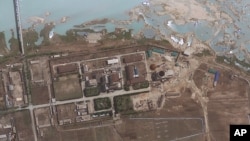As concern grows that North Korea may be preparing for another underground nuclear weapons test, a leading nuclear scientist says Pyongyang already may have acquired a device small enough to fit atop a missile.
David Albright, president of the Institute for Science and International Security, explained that the North does not need another nuclear test to acquire a militarized warhead.
“I think it is a mistake to think that they require this testing in order to design a militarized warhead. I think they may have gotten one from Pakistan or China," said Albright.
But Albright, who also worked as an inspector for the International Atomic Energy Agency, the U.N.’s nuclear watchdog, said that doesn't rule out another North Korea test.
"But what they can't get without testing is reliability. So the testing is invaluable to make sure everything works," he said.
The assessment came amid wide speculation about the North’s nuclear capability, triggered by the North’s warning that it could conduct a “new form” of nuclear test.
Nick Hansen, an analyst at the Center for International Security and Cooperation at Stanford University and 38 North, says the point of future tests will be focused on increasing Pyongyang's ability to weaponize its warheads.
“The only reason they are doing this in developing a warhead or a nuclear bomb is to put it on a missile," said Hansen.
He added that he thinks North Korea may be preparing for multiple, simultaneous tests.
"So one of the things you could think of is a new form of testing, is to test two bombs simultaneously or as close as they can get it. Pakistan did that by the way. And if you do that, you don't catch as much flack from the international community as you would if you test one off and then two months later test another one off," he said.
Despite growing concern in Seoul, a U.S. research group this week said there is "little evidence" North Korea will conduct a nuclear test during President Barack Obama's upcoming visit to Seoul.
South Korea said this week it detected increased activity at the North's Punggye-ri nuclear test site, suggesting an underground test could be imminent.
This report was produced in collaboration with the VOA Korean service.
David Albright, president of the Institute for Science and International Security, explained that the North does not need another nuclear test to acquire a militarized warhead.
“I think it is a mistake to think that they require this testing in order to design a militarized warhead. I think they may have gotten one from Pakistan or China," said Albright.
But Albright, who also worked as an inspector for the International Atomic Energy Agency, the U.N.’s nuclear watchdog, said that doesn't rule out another North Korea test.
"But what they can't get without testing is reliability. So the testing is invaluable to make sure everything works," he said.
The assessment came amid wide speculation about the North’s nuclear capability, triggered by the North’s warning that it could conduct a “new form” of nuclear test.
Nick Hansen, an analyst at the Center for International Security and Cooperation at Stanford University and 38 North, says the point of future tests will be focused on increasing Pyongyang's ability to weaponize its warheads.
“The only reason they are doing this in developing a warhead or a nuclear bomb is to put it on a missile," said Hansen.
He added that he thinks North Korea may be preparing for multiple, simultaneous tests.
"So one of the things you could think of is a new form of testing, is to test two bombs simultaneously or as close as they can get it. Pakistan did that by the way. And if you do that, you don't catch as much flack from the international community as you would if you test one off and then two months later test another one off," he said.
Despite growing concern in Seoul, a U.S. research group this week said there is "little evidence" North Korea will conduct a nuclear test during President Barack Obama's upcoming visit to Seoul.
South Korea said this week it detected increased activity at the North's Punggye-ri nuclear test site, suggesting an underground test could be imminent.
This report was produced in collaboration with the VOA Korean service.





